

Did Psychopaths Take Over Wall Street Asylum?: William D. Cohan. It took a relatively obscure former British academic to propagate a theory of the financial crisis that would confirm what many people suspected all along: The “corporate psychopaths” at the helm of our financial institutions are to blame.
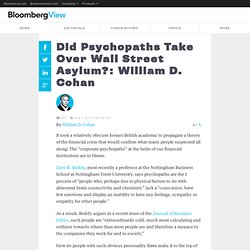
Clive R. Boddy, most recently a professor at the Nottingham Business School at Nottingham Trent University, says psychopaths are the 1 percent of “people who, perhaps due to physical factors to do with abnormal brain connectivity and chemistry” lack a “conscience, have few emotions and display an inability to have any feelings, sympathy or empathy for other people.” As a result, Boddy argues in a recent issue of the Journal of Business Ethics, such people are “extraordinarily cold, much more calculating and ruthless towards others than most people are and therefore a menace to the companies they work for and to society.” The Incentive Bubble. Photograph: Joe Costa/NY Daily News Archive via Getty Images: Macy’s Thanksgiving Day parade, 1939 The past three decades have seen American capitalism quietly transformed by a single, powerful idea—that financial markets are a suitable tool for measuring performance and structuring compensation.
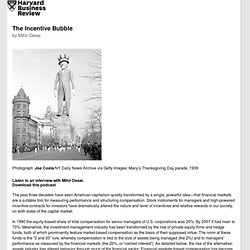
Stock instruments for managers and high-powered incentive contracts for investors have dramatically altered the nature and level of incentives and relative rewards in our society, on both sides of the capital market. Wall Street Confesses to Bonus Culture’s Ills: William D. Cohan. Imagine if you could hear directly, albeit anonymously, from the normally secretive bankers and traders who manufactured and sold the trillions of dollars in toxic debt securities that pushed the world’s financial system to the brink of disaster in 2008.
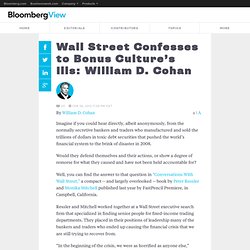
Would they defend themselves and their actions, or show a degree of remorse for what they caused and have not been held accountable for? Well, you can find the answer to that question in “Conversations With Wall Street,” a compact -- and largely overlooked -- book by Peter Ressler and Monika Mitchell published last year by FastPencil Premiere, in Campbell, California. Ressler and Mitchell worked together at a Wall Street executive search firm that specialized in finding senior people for fixed-income trading departments.
The Scam Wall Street Learned From the Mafia. Should Some Bankers Be Prosecuted? by Jeff Madrick and Frank Partnoy. Wall Street and the Financial Crisis: Anatomy of a Financial Collapse by the Majority and Minority Staff, Permanent Subcommittee on Investigations, US Senate 639 pp., available at hsgac.senate.gov Money and Power: How Goldman Sachs Came to Rule the World by William D.
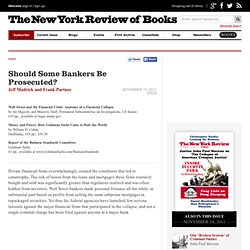
Cohan Doubleday, 658 pp., $30.50. The Case for Treating Big Finance Like Big Pharma - James Warren - Business. A pair of University of Chicago law professors say the federal government needs to regulate new financial products the same way it tests new drugs for safety Roadside Attractions Jeremy Irons captured a new Wall Street's moral ambiguity in the 2011 film "Margin Call" when his fictional chief executive lectured his investment bank staff on the three ways to make money.
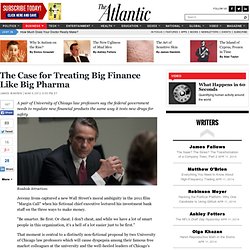
"Be smarter. Be first. Or cheat. "Too Big to Jail" by Simon Johnson. Exit from comment view mode.
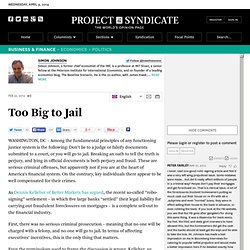
Click to hide this space WASHINGTON, DC – Among the fundamental principles of any functioning justice system is the following: Don’t lie to a judge or falsify documents submitted to a court, or you will go to jail. Breaking an oath to tell the truth is perjury, and lying in official documents is both perjury and fraud. These are serious criminal offenses, but apparently not if you are at the heart of America’s financial system. How Political Clout Made Banks Too Big to Fail. The U.S. has historically kept the financial sector in check through a combination of sound principles and serendipitous decisions.
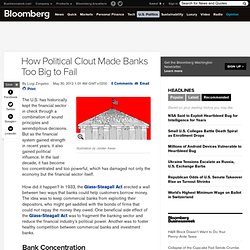
But as the financial system gained strength in recent years, it also gained political influence. In the last decade, it has become too concentrated and too powerful, which has damaged not only the economy but the financial sector itself. How did it happen? The Big Lie. Wall Street’s Euthanasia of Industry. Michael interviewed on Guns N Butter with Bonnie FaulknerListen here “When I was in Norway one of the Norwegian politicians sat next to me at a dinner and said, “You know, there’s one good thing that President Obama has done that we never anticipated in Europe.

He’s shown the Europeans that we can never depend upon America again. There’s no president, no matter how good he sounds, no matter what he promises, we’re never again going to believe the patter talk of an American President. Mr. Obama has cured us. A Giant Among Giants - By Ken Silverstein. When Glencore, the world's biggest commodities brokerage firm, went public in May 2011, the initial public offering (IPO) on the London and Hong Kong stock exchanges made headlines for weeks in the Financial Times and the trade-industry press, which devoted endless columns to the company's astonishing valuation of nearly $60 billion -- higher than Boeing or Ford Motor Co.

The massive new wealth turned nearly 500 employees into overnight multimillionaires and made billionaires of at least five senior executives, including CEO Ivan Glasenberg. "We are not going to change the way we operate," vowed Glasenberg, who had started as a lowly coal trader for the Swiss firm nearly three decades earlier and, with the IPO, immediately became one of Europe's richest men. Heist of the century: Wall Street's role in the financial crisis. Bernard L Madoff ran the biggest Ponzi scheme in history, operating it for 30 years and causing cash losses of $19.5bn.
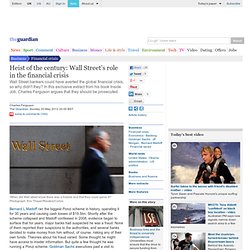
Shortly after the scheme collapsed and Madoff confessed in 2008, evidence began to surface that for years, major banks had suspected he was a fraud. None of them reported their suspicions to the authorities, and several banks decided to make money from him without, of course, risking any of their own funds. Theories about his fraud varied. Some thought he might have access to insider information. An Excerpt From “Killing the Competition: How the New Monopolies Are Destroying Open Markets”—By Barry C. Lynn.
Barry C. Lynn is the author of Cornered: The New Monopoly Capitalism and the Economics of Destruction. He directs the Markets, Enterprise, and Resiliency Initiative at the New America Foundation. His Harper’s Magazine article “Breaking the Chain: The antitrust case against Wal-Mart,” from the July 2006 issue, is available for free here. Fear, in any real market, is a natural emotion. There is the fear of not making a sale, not landing a job, not winning a client. Finance & Development, September 2011 - Equality and Efficiency. Finance & Development, September 2011, Vol. 48, No. 3 Andrew G.
Berg and Jonathan D. Ostry PDF version. Too Big to Fail Not Fixed, Despite Dodd-Frank: Simon Johnson. Here we go again. Major shocks potentially threaten the solvency of some of the world’s largest financial institutions. Concerns grow over the ability of European leaders to shore up their banks, which are reeling from a sovereign-debt crisis. In the U.S., the shares of some large banks are trading at less than book value, while creditor confidence crumbles. Private conversations among economists, regulators and fund managers turn naturally to so-called resolution powers -- the expanded ability to take over and wind down private financial companies granted to federal regulators by the Dodd-Frank financial reform law.
Jon Huntsman: Too Big To Fail Is Too Big. By Simon Johnson The idea that big banks damage the broader economy has considerable resonance on the intellectual right. Tom Hoenig, recently retired president of the Kansas City Fed, has been our clearest official voice on this topic. And Gene Fama, father of the efficient markets view of finance, said on CNBC last year, that having banks that are too big to fail is “perverting activities and incentives” in financial markets – giving big financial firms, “a license to increase risk; where the taxpayers will bear the downside and firms will bear the upside.” That Bank Bailout Was Way Bigger Than Anyone Thought - Business. Remember the $700 billion Troubled Asset Relief Program with which the federal government came to the rescue of faltering banks in 2008? Well, according to a Bloomberg report, that was just a fraction of the financial help the Federal Reserve Bank wound up doling out to troubled lenders.
The real total was reportedly closer to $8 trillion, after you add up benefits outside TARP, including emergency loans given at below-market rates: The $7 trillion secret loan program: The government and big banks should be punished for deceiving the public about their hush-hush bailout scheme. Photograph by Jupiterimages/ Getty Images. Imagine you walked into a bank, applied for a personal line of credit, and filled out all the paperwork claiming to have no debts and an income of $200,000 per year. What is the contribution of the financial sector? Too Big to Stop: Why Big Banks Keep Getting Away With Breaking the Law - James Kwak - Business. Where Is The Volcker Rule?
The Greater Recession: America Suffers from a Crisis of Productivity - Derek Thompson - Business. In fact, real wages for middle class men have declined by 28 percent since 1969, according to a report from the Hamilton Project. For men without a high school degree, they've fallen by a whopping 66 percent. Why the Rich Are Getting Richer. The road to political dictatorship. Berkeley Study: Rich More Likely to Behave Unethically. Central Bankers in the Line of Fire - Luigi Zingales. Exit from comment view mode.
Click to hide this space CHICAGO – Central bankers should not only be above suspicion of wrongdoing, but also appear to be above it. So the decision in January by Philipp Hildebrand, Chairman of the Board of the Swiss National Bank (SNB), to resign over allegations relating to a suspicious currency trade made by his wife, is to be welcomed. But, while Hildebrand’s resignation should serve as a precedent to be followed by central bankers – indeed, all public officials – everywhere, the circumstances surrounding his departure smell much worse than what caused it.
On August 15, 2011, Hildebrand’s wife, Kashya, exchanged 400,000 Swiss francs into dollars. A central banker should put his and his spouse’s money in a blind trust. "Better than Basel" by Stefano Micossi. Exit from comment view mode. Click to hide this space. The Credit Crisis Five Years On: Unpacking the Crisis. "The Corporate-Tax Conundrum" by Laura Tyson. Exit from comment view mode. Click to hide this space. Does the Latest Failure of Bank Regulation Mean Banks Can't Be Regulated? - National. Bankers constantly lying, defrauding; most still not in jail. Has there ever been a better time to be a disastrously inept banker? Well, probably — over the course of human civilization it’s almost always been a pretty good time to be a banker — but today’s finance titans seem uniquely immune to punishment of any sort. Remember how JPMorgan Chase accidentally lost $2 billion in a “hedge”-slash-huge stupid bet placed by a guy in the Chief Investment Office?
Funny story, it will actually end up being closer to $6 billion, or maybe like $9 billion — who can be sure, math is pretty complicated, it’s all imaginary money anyway — as the bank attempts to extricate itself from the insanely complex losing trade made by the office that is supposed to manage the bank’s risk. Funnier story: Remember when Mr. Libor Rate Faces Review Amid Barclays Scandal. The LIBOR affair: Banksters. Michael Tomasky: Why Jamie Dimon Should Resign from J.P. Morgan. Wall Street Does Not Care About JPMorgan's Loss. Jamie Dimon’s $2 Billion Mistake: The JP Morgan Chase fiasco, and how to fix Wall Street. Inside J.P. Morgan's Blunder. $3 Billion and Counting: JP Morgan's Loss Grows by 50% in 5 Days - Derek Thompson - Business. Is It Time to Downgrade the Rating Agencies? Standard & Poor’s and Other Ratings Agencies Must End Their Power Trip. Sovereign ratings when default can come explicitly or via inflation.
Lets rate the credit raters. Culture in Economics and the Culture of Economics: Raquel Fernandez in Conversation with The Straddler. The People vs. Private Equity. More Unequal than Others - Pranab Bardhan. Michael Hudson: Debt and Democracy – Has the Link Been Broken? How Paulson Gave Hedge Funds Advance Word. Dave Lauer: It Ain't Rocket Surgery: The Skewed Incentives and Dangerous Consequences of High-Frequency Trading. Ray Dalio: Man and machine. Free the Banks! The Case for Massive Deregulation of the Financial System - Megan McArdle - Business. Democratize Wall Street, for Social Good. In Defense of Oil Speculators. Special Report: The algorithmic arms race.
Out of Control: The Destructive Power of the Financial Markets - SPIEGEL ONLINE - News - International. Where Is Our Oil Price Collapse? John Lanchester · The Non-Scenic Route to the Place We’re Going Anyway: The Belgian Solution · LRB 8 September 2011. Where is Wal-Mart when we need it? What is Debt? – An Interview with Economic Anthropologist David Graeber. The art of business and the science of economics. Yellen, Aggregate Demand and the Global Economic Recovery. Finance Now Exists For Its Own Exclusive Benefit. Nanosecond Trading Could Make Markets Go Haywire.
Human Nature and a Volatile Stock Market. Andrew Haldane · The Doom Loop: Equity in Banking · LRB 23 February 2012. How Banks Are Using Your Money to Create the Next Crash. Michael Hudson: Banks Weren’t Meant to Be Like This. Is neuroscience the new ‘Freakonomics’? - Ideas@Innovations. Hudson: The Neo-Rentier Economy « Multiplier Effect. Reckless: The Inside Story of How the Banks Beat Washington (Again) - Jesse Eisinger/ProPublica - Business.
Tim Geithner: Financial Crisis Amnesia. MF Global: The Untold Story of the Biggest Wall Street Collapse Since Lehman. "Predators and Professors" by Simon Johnson. CEOs and the Candle Problem - A Mad Hemorrhage Blog.